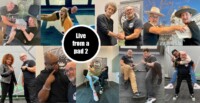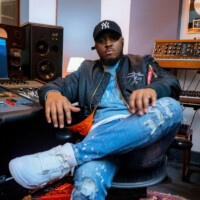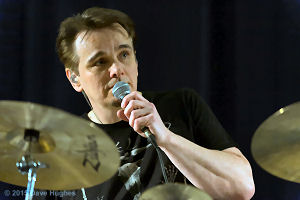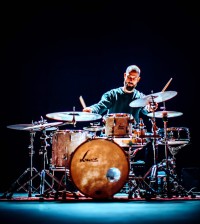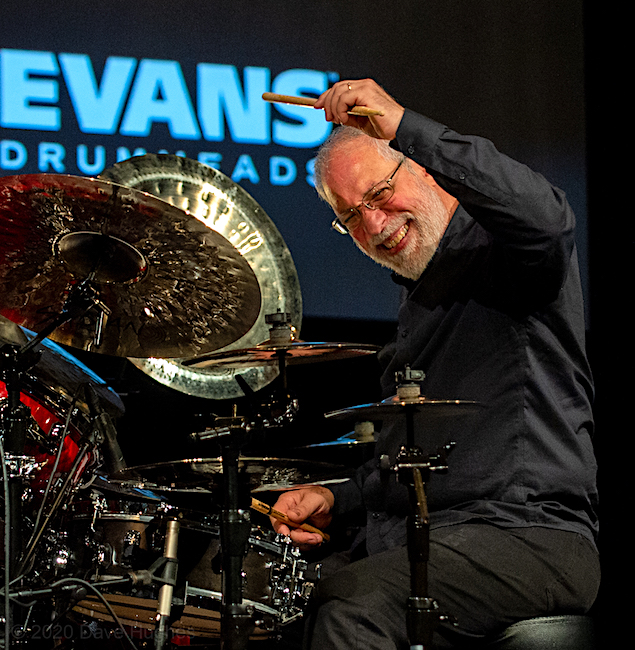 With a title like ‘Drumming’s Global Ambassador’, Dom Famularo doesn’t actually need an introduction anymore.
With a title like ‘Drumming’s Global Ambassador’, Dom Famularo doesn’t actually need an introduction anymore.
Growing up on Long Island, New York, Famularo had the arguably greatest jazz scene in the world on his front porch – and with it, the godfathers of drumming.
Hanging out backstage at Buddy Rich gigs and taking lessons from legends such as Joe Morello, Jim Chapin and Ted Reed (just to name a few), taught Dom much more than ‘just drumming’ and soon grew him into a sought after jazz musician and session drummer himself.
Today Famularo has spent over 30 years traveling the globe to share this knowledge and has thereby become one of the most influential and important drum educators of our time.
I had the pleasure to chat with Dom at the UK Drum Show in Manchester to talk about his musical upbringing, his work and passion in spreading drum education and his efforts to improve mental health amongst (but not only) musicians.
How did you get into drums?
I come from an Italian/American family. I had two older brothers and a younger sister. My mum sang, my sister sang and there has just always been music around. At 11 years old me and my siblings heard the Beatles on a TV show as they hit America and it sparked our interest to get even deeper into music. Our parents got us some equipment and we were up and running. Once we were hooked by the bug of playing music and seeing people react in a positive way, I decided I wanted to do that as long as I can.
You grew up in New York.
I grew up in a little town on the south shore of Long Island called Baldwin, which is only about a 15 minute ride out of New York City. So the advantage of being there was being so close to where all the great drummers were playing. There were times were I went to hear Elvin Jones, Tony Williams, Steve Gadd and Buddy Rich in just one night! It was amazing to experience the energy and the vibe that New York had. And New York is still that way, and because it’s so easy to get around, it was very easy to see so many musicians. It was the university of drumming. The knowledge was there to be taken and I took advantage of it.
What was the musical influence like? Was it more jazz heavy?
It started out with pop. Pop music was the attraction because we were young and very much influenced by what was being played on the radio. Then when I was about 15/16 years old I was introduced to Buddy Rich and his Big Band and that opened me up to a whole other way. Then I heard Elvin Jones with John Coltrane which opened up a whole other area. There was a club called ‘The Village Vanguard’ where Thad Jones and Mel Lewis played with their band every Monday night and I would go there every week with my friends. At that time it was the tail end of the Big Band era so I was able to hear Count Basie, Duke Ellington, Buddy Rich’s band, Louie Bellson’s band, Stan Kenton… It was so exciting to hear these bands play. If you hear 19 musicians play together as one, that feeling is incredibly empowering.
From a drummers standpoint: If you play with a big band (as I did for many years when I was younger), when you go to hit a crash cymbal and you have 5 trumpets, 4 trombones and 6 saxes hitting that note with you and the copper / brass / tin sound of that cymbal blends, it’s a high that can only be experienced from that drum chair. It’s amazing
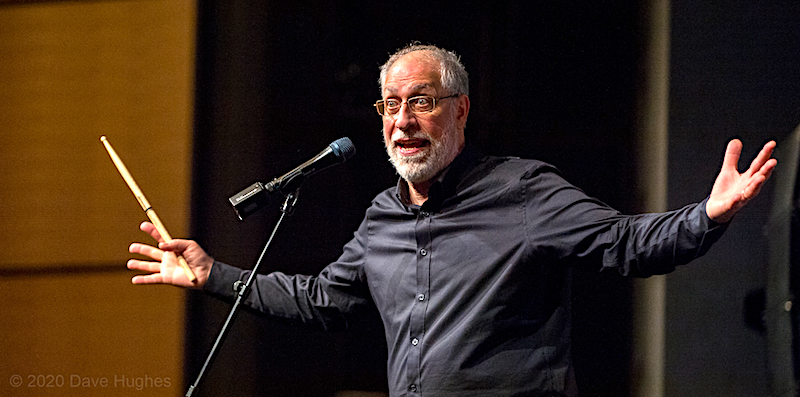 You really learned from the greats: Joe Morello, Jim Chapin, Papa Joe Jones…
You really learned from the greats: Joe Morello, Jim Chapin, Papa Joe Jones…
Yes. They were all in the New York area and it worked out well. My teacher on Long Island was Al Miller. I had a few other teachers too but what was special about Al is that he was friends with Buddy Rich. He was in the Marines with Buddy where they both taught martial arts and it just so happens they were also both drummers. So here they are paired together battling the war together and when they came out of the war they became good friends. Whenever Buddy was in town he would call Al Miller. I was one of Al’s top students so he would call me up and we’d go to see Buddy’s band. Once you’re backstage at a Buddy Rich concert, you meet three different levels of people:
First of all you meet all the great drummers. That’s where I met Morello, Carl Palmer, Steve Gadd, Papa Joe Jones, Max Roach, Mel Lewis… all these guys would be backstage to hear Buddy. I was there shaking all those guys’ hands.
The next group of people you meet are the great band leaders that came to see Buddy. I met Duke Ellington, Count Basie, Benny Goodman and Stan Kenton. It was amazing and the camaraderie was beautiful to see.
Third group of people you meet is the Rat Pack: Frank Sinatra, Dean Martin, Joey Bishop, Sammy Davis Jr…. Jerry Lewis is Buddy Rich’s daughters god father! (Jerry was actually a great drummer; as was Sammy Davis Jr.). There was this energy backstage that was really magical and it was amazing to experience that.
You’re probably the most passionate person I’ve met in the drumming industry. Is that a trace from hanging out with all the Legends and there energy and camaraderie?
Great question Tobias because it really is just that.
I saw these great musicians, these legends that were on television and in the movies, and when they got together the humanity, the hugging, kissing, the love that was there and the respect and support they had for each other for their music was so emotional to witness. I couldn’t believe it. Sinatra said to Buddy: “Man, you’re sounding better than ever.” You heard these guys talking like we talk as musicians. They were just musicians hanging out; they just happened to be great at what they did and they became legends. And that’s because they committed themselves to every performance 100%. And that’s what I really stole from those guys.
When I perform I’m gonna speak and perform at the top of my game and give 100% at that moment.
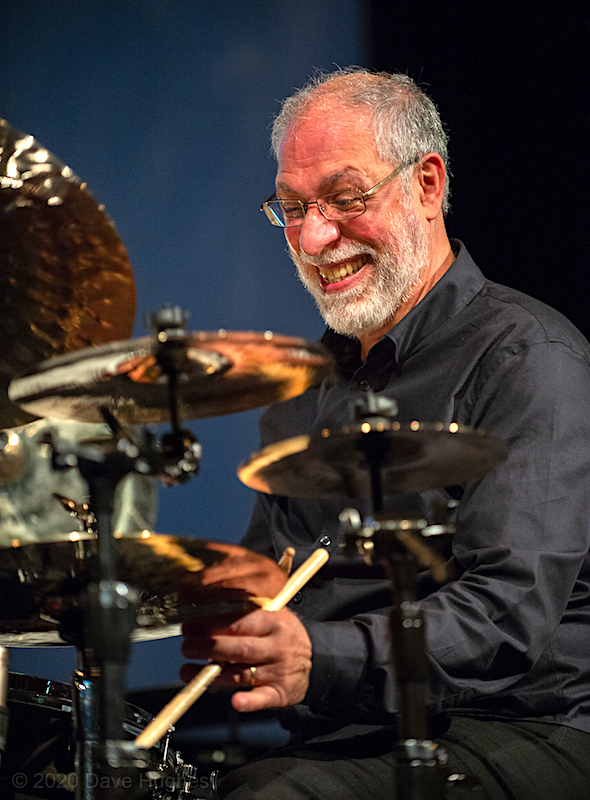 Do you think that’s missing a bit nowadays where things seem to feel more competitive?
Do you think that’s missing a bit nowadays where things seem to feel more competitive?
Good point. It has gotten way more competitive and I think that’s because now you have these ‘Idol’ shows or ‘Britains Got Talent’ or whatever they have and it makes it more of a contest and we seem to lose the fact that art is not about competition. The uniqueness of art is that you can love all different types of art that are very different from each other. Not only can I enjoy different part of them in the music scene (where I can love rock, jazz, latin, funk, fusion, bebop, all kinds of genres), but I can also love all different types of art like different painters and actors. To me that really is a major part of what brings people together and that’s getting a little segregated.
Social media plays a part in that too, against it and in advantage of it. Both sides of the sword as they say.
Your career has brought you to play with many artists from a variety of genres from the Buddy Rich big band to B.B. King.
Yes. Living in the New York area allowed you to have a wide variety of performances. In the 70s I was doing a lot of jingle dates. At that time the jingle market was so good that you would go into the studio and record jingles all day. Perfume, fashion, anything really. You had this list of songs where you sometimes would play 1 song in maybe 10 different ways and 10 different feels.
Apart from that I was just called to do certain dates. There is this great story from when I played with B.B. King. They got us all in for a rehearsal, we had charts for all the songs and got ready to play and B.B. turns around to us and says: “I want to see how well you guys can play my fastest tempo”. When someone says that, you kind of buckle yourself in your seat expecting something crazy fast. He looks me in the eyes and goes: “One…….Two…….Three…….Four…….” and it was so slow. We’re all New York musicians so of course we all locked into it and held it in there. We played maybe eight measures of the song reading the chart, B.B. stops us and says: “You guys are good. See you on stage”. And that was the rehearsal. It was so great.
I played with B.B. that night and a few nights later I played with Lionel Hampton’s big band; a few days later with Tito Puente and his band doing a Latin gig where I was the only one not speaking Spanish, on the weekend I played a show with George Benson. That’s what New York was at that time. You had to survive by playing lots of different styles and you had to play them well. If you didn’t play them well they let you know.
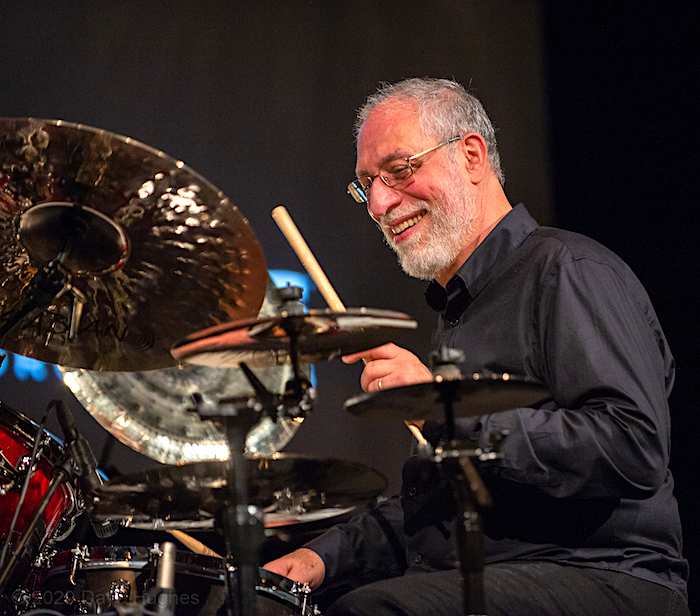 All the playing aside, a big passion of yours is teaching. Where did that come from?
All the playing aside, a big passion of yours is teaching. Where did that come from?
Absolutely. It’s always been that way. My parents were great teachers although they weren’t working in the teaching profession. For example our parents never taught us love, they were too busy showing us. Teaching by example. I learned that from them and it really is a very big part of the process. I got involved with teaching at the age of 17, I’m now 66, so that’s 49 years of teaching non-stop. I’ve never advertised but I have well over 2500 students that travel to me from over 30 countries; 50% of them are on Skype and 80% of them are teachers. So I realise the responsibility that I have to prepare this next generation for what they do.
The excitement is that I started to see how by sharing the information that I collected by playing, experimenting and developing, I lifted them up to enjoy their passion more. There is a real deep power in that. I kept going on with it and try to keep balancing it within my travel schedule and it has just been a wonderful adventure that I still continue to enjoy and I hope to be able to do it as long as I can.
You’ve done a lot of education work with companies too: the Vic Firth educational side, later then Sabian and Mapex…
Yes. I had this desire to take the education globally. For example I’ve been with Sabian for 30 years now and Andy, the president of Sabian, is a brilliant mind who sees the importance of investing back into education. He was actually sitting on a panel with me at the Drum Show here today answering questions from hundreds of drummers. What other president of a company does that? They actually have a site called the Sabian Education Network which I helped to develop together with Joe Bergamini who manages the site. If any teachers are listening: go to Sabian.com/joinSEN, join and connect with the other 5000 teachers globally that are communicating with each other. There is tons of fantastic information.
I’m also the education director and consultant for Mapex. So I track down teachers globally and by bringing all of these companies together we empower teachers and lay a better groundwork for the future of drumming. Those educational networks will be around forever. Go and join and be a part of the wave that moves education forward.
Talking about educating globally: you have your own ‘WizDom’ drum schools all over the globe too.
I do. I put together a school at my home which is a 8×8 meter room that I built in the back part of my property. It’s completely sound contained and has two drum sets, practise pads, snare drums and cameras all over the place. I did that in the early 2000s, way ahead of what anybody else was doing. I was even doing online lessons when Skype was dial up! Everyone told me that I’m crazy but I said: “well, I’ll be crazy but I’ll be reaching more people”. I had many students that came to me who then wanted to start schools of their own so I began to franchise the idea. Now we have three schools in France, and schools in Italy, Hong Kong, London and Brazil. The energy of all these different influences is very exciting. It’s still growing, I’m having fun with it and we are now able to spread the message even wider.
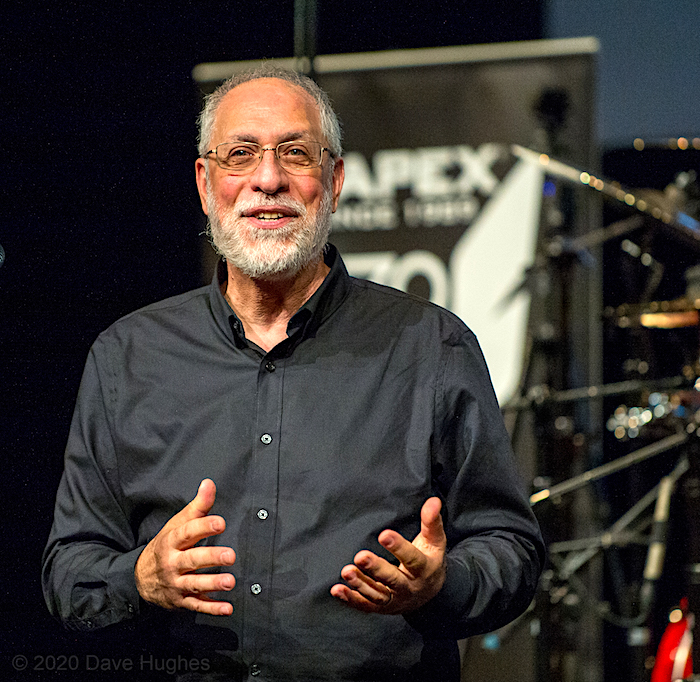 I want to pick up on one message from your teaching that I heard you talk about: You said that while there are many ways to hold your stick, they all have a value and a different place and time in your playing – and as a drummer you should master them all. I couldn’t agree more with that but have experienced many teachers who try to ‘force’ you into their way of playing.
I want to pick up on one message from your teaching that I heard you talk about: You said that while there are many ways to hold your stick, they all have a value and a different place and time in your playing – and as a drummer you should master them all. I couldn’t agree more with that but have experienced many teachers who try to ‘force’ you into their way of playing.
Absolutely. Listen, I learned from guys like Joe Morello, Jim Chapin, Shelly Manne, Ted Reed, Papa Joe Jones, Elvin Jones, Tony Williams, Jim Keltner, Roy Burns, Louie Bellson… I had lessons with some really great masters and when they explained all these different grips to me, I saw the need there and that was the common way of thinking.
They were all great players and when a great master gives you information, I’m not gonna argue with that.
Regarding the different hand positions from German, American and French – there might be times where I’m playing on the cymbal in French grip but I’m playing the snare drum in German grip because I need more power and that one has more muscles behind it.
Understanding the different tools of movement and the momentum around them is crucial.
The three great drummers I wanted to learn from where Billy Gladstone who studied finger technique, George Lawrence Stone who worked on wrist and rebound technique and Sanford Moeller with the large arm whipping technique.
Every drummer that plays uses those 3 techniques so by studying them even deeper, it gives you a wider range of how to use them. When you’re on the drum kit with all the angles of the drums and cymbals, you’re gonna need those different positions. So I might be playing a groove and within one measure I might use all 3 hand positions and all 3 different movements. My point is: become aware of it, from that awareness your body will then know how to react and that becomes the magical point of playing.
You also do a lot of motivational speaking and brought out a book called ‘The Cycle of Self Empowerment’. Does this go hand in hand with music?
It really does. As I was travelling around the world doing these drumming events I started to hear a lot of questions from students showing that they were not empowered. They didn’t believe themselves, put themselves down and generally had a very negative way of speaking. That is very disempowering.
Social media has an effect on that and we have to become aware the thoughts that we have and the words that we use so we don’t think and word ourselves to failure.
I began to write a lot of these notes down for myself, that became a computer file, that grew and all of a sudden I realised I had a book there and I call it the cycle of self empowerment. I came up with a formula – you can download the formula for free from my website domfamularo.com – that will help people think about how they can empower themselves.
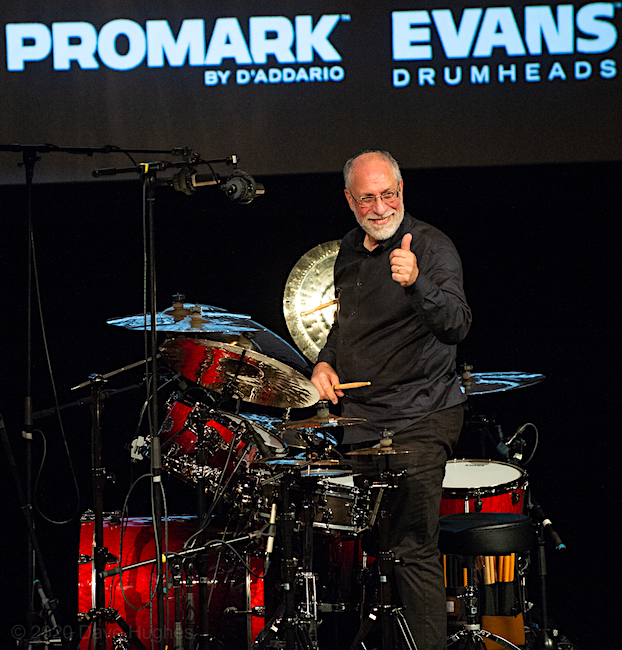 For the same reason I’ve put together a ‘drum teacher lineage’ that shows where the information came from. I wanted to learn from Gladstone, Stone and Moeller but by the time I was ready to learn their stuff they had already passed away. So my next question was “who were their best students?”. For that I went to Shelly Manne, Morello and Chapin and that’s where I got that information. That knowledge that came down taught me discipline and perseverance and those are qualities that I was able to take over into the cycle of self-empowerment.
For the same reason I’ve put together a ‘drum teacher lineage’ that shows where the information came from. I wanted to learn from Gladstone, Stone and Moeller but by the time I was ready to learn their stuff they had already passed away. So my next question was “who were their best students?”. For that I went to Shelly Manne, Morello and Chapin and that’s where I got that information. That knowledge that came down taught me discipline and perseverance and those are qualities that I was able to take over into the cycle of self-empowerment.
These qualities of being dedicated, having high morals, persevere, never give up, patience… all these words are being discussed in the book.
I put the book together, found a publisher and I started selling thousands of copies in over 30 countries. Then companies started calling me saying they read the book and wanted me to come in and do a talk. Next thing I know I’m flying all over the world to hold talks about this topic. It’s a really exciting journey.
I think that mental health is a very underrated topic, especially in a business where we’re all “the cool guys on stage”. There is a lot of borderline depression in the business, drummers not believing in themselves, getting talked down by their peers or having their music slated by trolls on the internet.
Depression is a very serious thing and you could probably label it as a disease. It’s out there, it’s alive and it’s well and by talking about self-empowerment and being involved in the music industry where we’re expressing what we feel. Those are tools to free us of that and lift us to a higher level. You can empower someone else through your music.
We have to understand that we all have a purpose and when we find that purpose you have to share it. That becomes pretty empowering.
Finally, what’s next?
I am just back from the NAMM Convention. I filmed 15 more interviews for The Sessions Panel on YouTube and just got back from recording over 20 lessons for Drumeo. I return the end of February for the Drumeo festival in Vancouver then off to Germany.
The adventure continues…
Thanks a lot for your time Dom!
Interview by Tobias Miorin
March 2020
Photos by Dave ‘The Drummer’ Hughes

